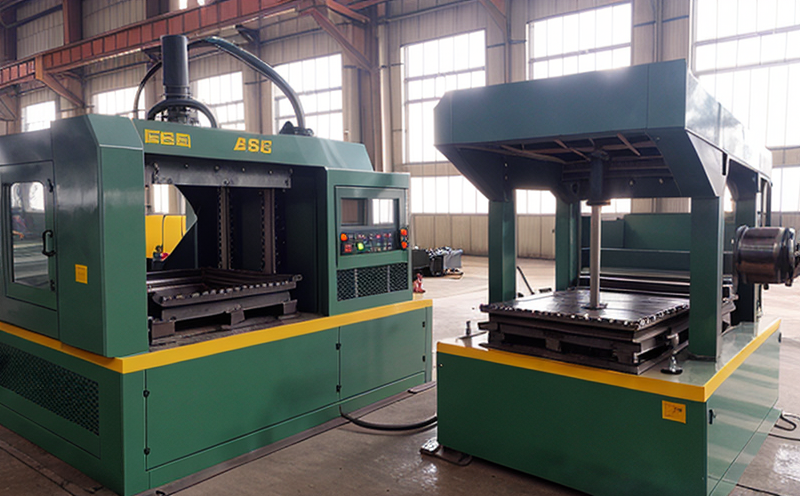EN 12438 Titanium Forgings Mechanical Testing
The EN 12438 standard is a European Norm that specifies mechanical testing methods and requirements for titanium forgings. This service ensures compliance with international standards, providing accurate and reliable testing results essential for the quality assurance of titanium components used in industries such as aerospace, automotive, and medical.
Titanium forgings are widely used due to their exceptional strength-to-weight ratio and corrosion resistance. However, these properties make it critical that the forgings meet stringent mechanical property requirements. The EN 12438 standard covers a range of tests including tensile testing, hardness testing, impact testing, and bend testing.
Tensile testing is crucial for determining the yield strength and ultimate tensile strength of the forgings. Hardness testing provides information on the hardness properties of the material which can indicate internal quality and uniformity. Impact testing assesses the toughness of the forging by measuring its ability to absorb energy up to fracture. Bend testing evaluates the ductility and resistance to cracking.
For specimen preparation, the EN 12438 standard specifies that samples should be cut from the forgings in such a way as to ensure representativeness. The specimens are then prepared according to the specific requirements of each test method, including surface finishing and edge treatment to avoid introducing artifacts into the mechanical properties.
The testing equipment used for these procedures includes universal testing machines equipped with appropriate fixtures and grips, hardness testers like Brinell or Rockwell machines, impact testers such as Charpy V-notch, and bend test rigs. The results are analyzed in accordance with EN 12438 to ensure that the mechanical properties of the titanium forgings meet the required specifications.
The importance of this service cannot be overstated. It ensures that manufacturers can deliver high-quality components that not only meet but exceed regulatory requirements, thereby enhancing product reliability and safety. This is particularly critical in industries where component failure could lead to catastrophic consequences such as in aerospace applications.
Compliance with EN 12438 is also important for international trade, ensuring that products can be freely traded across borders without the need for additional or conflicting tests. It helps build trust and confidence among customers and stakeholders, which is vital for long-term business relationships.
Industry Applications
Titanium forgings find extensive use in various sectors due to their superior mechanical properties. In aerospace applications, they are used for engine components, airframe structures, and landing gear. The automotive industry utilizes titanium forgings for exhaust systems, transmission cases, and suspension parts due to their lightweight and corrosion resistance.
In the medical sector, titanium forgings are used in orthopedic implants such as hip and knee joints because of their biocompatibility and strength. In the energy sector, they are employed in turbine blades and pressure vessels for their high-temperature performance and resistance to chemical corrosion.
The EN 12438 mechanical testing service is essential for ensuring that these critical components meet the stringent requirements set by the industry standards. This ensures that manufacturers can deliver products that are not only reliable but also safe, which is crucial in sectors where component failure could lead to significant risks and costs.
Environmental and Sustainability Contributions
The use of titanium forgings contributes positively to environmental sustainability. The lightweight nature of titanium allows for improved fuel efficiency in vehicles and aircraft, reducing carbon emissions. In the aerospace industry, lighter components can lead to a reduction in fuel consumption, which translates into lower greenhouse gas emissions.
Moreover, titanium is recyclable without losing its mechanical properties, making it an environmentally friendly material choice. This recycling capability reduces the demand for raw materials, thereby minimizing environmental impact. The EN 12438 testing ensures that the recycled titanium maintains its integrity and performance, further supporting sustainable practices in manufacturing.
The testing service also plays a role in reducing waste by ensuring that only high-quality forgings are used. This minimizes the need for rework or scrap, which can significantly reduce material consumption and associated environmental impacts. By adhering to EN 12438 standards, manufacturers contribute to more sustainable manufacturing processes.
Competitive Advantage and Market Impact
- Innovation Leadership: Compliance with international standards like EN 12438 positions a company at the forefront of innovation. It ensures that products are developed using the latest testing methodologies, which can lead to breakthroughs in material science.
- Better Product Quality: By adhering strictly to these standards, companies can ensure consistent product quality across all batches and production runs. This leads to a better reputation among customers and stakeholders.
- Market Access: Compliance with global standards like EN 12438 opens up international markets for manufacturers. It ensures that products meet the regulatory requirements of various countries, facilitating easier trade.
- Cost Efficiency: While initial testing costs may be high, long-term benefits such as reduced rework and scrap, improved product reliability, and enhanced reputation can lead to significant cost savings.
The EN 12438 mechanical testing service provides a competitive edge by ensuring that products are not only of the highest quality but also meet international standards. This is crucial in global markets where compliance with such standards is often a prerequisite for entry.





